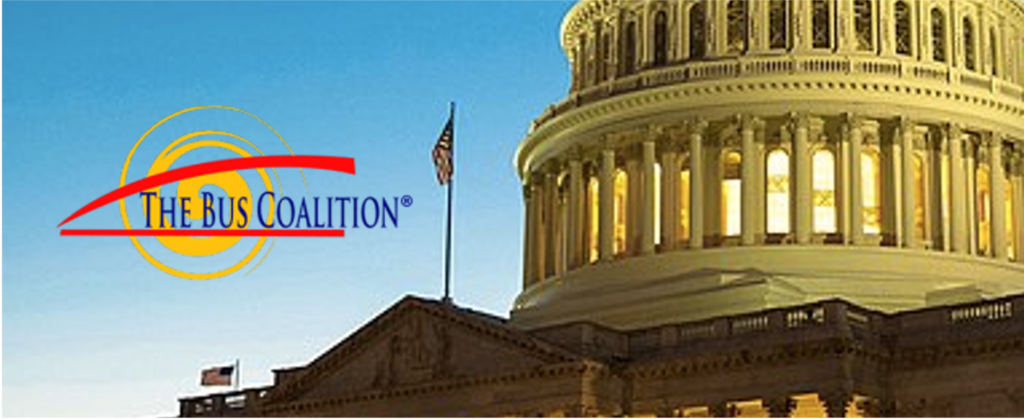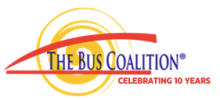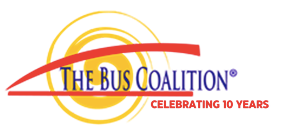
The Bus Coalition
2022 Federal Agenda
The Bus Coalition (TBC) is an association of over 350 members from 47 states working with the Administration and bipartisan Members of Congress to ensure adequate funding for the nation’s critical bus transit programs. In communities large and small, bus transit has proven a vital lifeline and an engine of opportunity connecting millions of Americans.
(Click here for a printable 2-page summary of the 2022 TBC requests)
The Bipartisan Infrastructure Law (BIL) represents an historic investment in public transit as a whole and bus transit in particular. After years of disinvestment, the BIL increases the Bus and Bus Facility program from $808 million in FY21 to $2.2 billion in FY26.
Funding levels included in BIL will go a long way to helping transit systems of all sizes upgrade aging bus fleets, expand mobility options, boost economic growth, reduce greenhouse gas emissions and ensure better access and equity. TBC and its members are committed to ensuring these substantial new federal investments are spent wisely and efficiently.
To ensure successful implementation of BIL, The Bus Coalition supports FTA and Congressional action on these top priorities:
1. Zero Emission Bus – Fleet Transition Plan Requirement and Flexibility
FTA Recommendation: We encourage FTA to release timely and clear guidance on the information transit systems need to include within the bus fleet transition plan and ensure flexibility in the initial grant rounds.
To apply for zero-emission buses in the competitive grant program, language within BIL requires transit systems to submit a Fleet Transition Plan. Per the legislation, this plan must address issues such as finance, utility, workforce development and long-term fleet management.
2. Battery Storage – Battery/Bus Separation
FTA/Congressional Recommendation: We encourage Congress and the FTA to allow bus batteries to be repurposed after the battery has exhausted its propulsion-source useful life but remains viable as an energy storage device.
As we invest billions in battery electric technology, it is critical we explore opportunities to provide sustainable and practical solutions for transit systems to transition. Unfortunately, current federal regulations do not allow bus batteries to be separated from the bus as they are both considered one asset. This “pairing” causes significant problems because the useful life of a bus (12-years) is generally longer than the useful life of the battery as a propulsion source.
If this barrier is lifted through legislation or executive action, older batteries could be removed from the bus and repurposed for battery storage for onsite charging. Thus, transit systems could establish a battery storage system with batteries that still have a useful life, but not enough power for bus propulsion.
This new requirement, while well intentioned, could become an obstacle for many systems across the country seeking funds in 2022 for zero emission/electric buses. Many transit systems do not have these plans on the shelf, and it would take time and money to complete a robust long-term analysis. We look forward to working with FTA to ensure the grant program remains accessible and continues to represent the true bus replacement and expansion need.
3. Department of Energy Coordination with FTA
FTA Recommendation: We support close coordination between DOE and FTA to ensure transit systems have a voice in how critical and complimentary DOE grid resiliency grants are deployed in communities across the country.
The significant investment in zero emission buses will require utilities to upgrade grid capacity nationwide. Charging a fleet of buses requires a significant amount of power and many communities simply do not have the grid infrastructure to handle surges necessary to charge dozens of buses at once. The Department of Energy was provided more than $5 billion for grid modernization within BIL and we need to ensure transit systems are considered a key stakeholder as the agency establishes this new program.
4. Spare Ratio Flexibility
FTA Recommendation: We strongly support spare ratio flexibility that recognizes growing pains associated with adopting EVs, a new and emerging technology. In addition, spare ratio flexibility should be clearly communicated to transit systems consistently from both FTA headquarters and regional FTA offices.
Per FTA Circular 9030.1C, the number of spare buses in the active fleet for grantees operating 50 or more revenue vehicles should not exceed 20 percent of the number of vehicles operated in maximum service. The spare ratio rule could penalize transit systems that transition to zero-emission buses.
With the transition to a new technology, there is bound to be growing pains. It’s already apparent from transit systems that have entered the EV space, there will be challenges to fleet performance and management. This includes impacts of different climates (cold/hot), terrain, long rural routes and other factors that impact EV buses differently than traditional gas-powered vehicles. In addition, transitioning to electric buses requires additional training for drivers and maintenance crew which also impacts the spare ratio.
5. Support the $10 billion Affordable Housing Access Program
FTA/Congressional Recommendation: We strongly support passage of the new $10 billion Affordable Housing Access Program included in the Build Back Better Reconciliation bill.
The Affordable Housing Access Program, included in Build Back Better, would invest $10 billion to improve transit access to affordable housing, enhance mobility for low-income riders and residents in disadvantaged neighborhoods, address the backlog of buses and facilities that have fallen out of a state of good repair and support America’s transit workforce.
6. Local Match Concerns
FTA Recommendation: We encourage FTA to provide greater flexibility and relax local match requirements where possible, especially as transit systems continue to be negatively impacted by the pandemic.
Especially for mid-size and small transit systems, coming up with a local match can be challenging. Zero emission buses provide significant benefits, but they are more expensive and require significant infrastructure upgrades adding to the cost of transition. The transit industry is already seeing cost escalations upwards of 20% because of workforce and supply chain shortages. These cost increases are not isolated to transit, so many cities will have to come up with more local funds to take advantage of many elements of the infrastructure package that also require a local match.
Below are links to our previous issue briefs, legislative summaries and membership calls to action. Click on each doc to download the files.
(March 2020) TBC 2-pager summarizing current improvements in Federal bus transit funding, and additional needs for support in FAST Act Reauthorization, FY21 proposals, and inclusion in a potential federal infrastructure package.
(July 2019) TBC 2-pager summarizing the need for additional federal funding requests, the Coalition’s current funding level requests and notes on TBC support for a possible federal infrastructure package.
(September 2018) TBC Letter to House and Senate Chairs and Ranking Members of Transportation Appropriations Subcommittees. Urging committee members to support bus transit via increases in the FY19 appropriations cycle.
(July 2018) Talking points for TBC members on Coalition priorities to restore funding levels to bus systems for Member correspondence and upcoming Capitol Hill Vicits.
(March 15, 2018) For the FY2018 Appropriations process we have prepared this 2-page overview of The Bus Coalition, our membership, shared interests and legislative priorities.
(March 8, 2018) This letter to the Appropriations Committee outlines TBC funding priorities for FY2019 and beyond.
(November 27, 2017) This chart showing effects of MAP-21 on national bus funding.
(April 5, 2017) This letter to the Appropriations Committee outlines TBC funding priorities for FY2019 and beyond.
(April 4, 2017) Letter to Support Sec 5339(b) language in the transportation bill, focusing on useful life challenges to our existing bus fleets.
(March 17, 2017) TBC Letter in support of Congressman De Fazio’s bill.
(March 17, 2017) Bus manufacturer overview including full-bus and parts manufacturing in the United States.
(February 27, 2017) 2017 Letter to the Trump Administration from The Bus Coalition and CTAA members on the transportation legislation in the 115th Congress.
(December 2015) Chart showing effects of House and Senate Fast Act changes on Bus Transit Funding.

